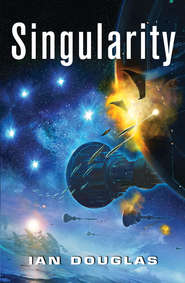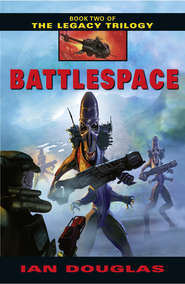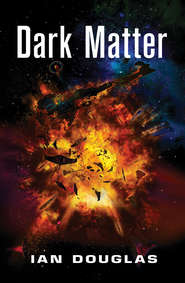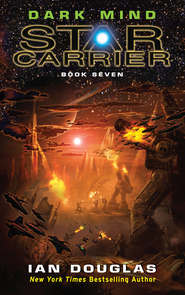По всем вопросам обращайтесь на: info@litportal.ru
(©) 2003-2025.
✖
Galactic Corps
Настройки чтения
Размер шрифта
Высота строк
Поля
Integration complete, a voice—partially his own—said over the Intel net. Ramsey-Thoth now ready for launch.
Ramsey’s body was lying on one of the link couches inside Hermes’ Combat Ops Center, or COC, but his mind was … elsewhere. Linked by his neural implant system into Hermes’ computer network, with all other input signals blanked by his software, his mind’s eye was now residing within a narrow, tightly bounded virtual space representing a K-794 Spymaster probe.
Ramsey’s thoughts were integrated now with a powerful artificial intelligence given the name “Thoth,” an apt enough name, since the original Thoth had been the ancient Egyptian god of science, writing, knowledge … and magic. Designed to operate in this curious blend of human and artificial intelligence, Thoth provided Ramsey’s viewpoint with the speed, power, precision, and data acquisition functions of an AI. Ramsey provided purely human talents of flexibility, creativity, and intuition not yet possible for even the most powerful AIs.
The subjective effect was to give Ramsey a thrilling, deep-centered sense of truly godlike power and control, a feeling utterly unlike any other. It felt … wonderful. Addictively so.
“Probe Ramsey-Thoth is clear for launch,” the voice of Lieutenant Karen Hodges said in his mind. She would be his link with COC Control. “At your discretion, Gunny.”
“Copy that,” Ramsey replied.
“Be advised that a Type III is now transiting the gate,” Hodges added. Images built themselves up in an open window in Ramsey’s mind. He could see the two-kilometer Nightmare slowly emerging from the gate, its hull beginning to sparkle with the impacts of incoming fire. “Could be a good target of opportunity.”
“Copy that, COC Control. See you all back at the farm.”
With a thought-click, a powerful magnetic field hurled the probe clear of Hermes and into empty space. The probe’s N’mah-derived space drive switched on, and the Spymaster, with Ramsey’s viewpoint on board, hurtled toward the fizzy, nebular haze gathered in front of the stargate.
Targeting the emerging Type III, Ramsey locked onto the huge vessel and accelerated. …
Nine years ago, Ramsey had been a Marine gunnery sergeant, an enlisted grunt with twelve years of active duty behind him. He’d been part of the assault team that had gone into a planetoid hollowed out by the alien Eulers, and been the first human to establish direct mind-to-mind contact with them.
For another year, he’d served with the MIEF Contact Team, helping to establish the protocols and translation software that let humans communicate freely with the deeply alien, benthic species known as the Eulers, and worked as well on the design of Euler triggerships, adapting them for human use. At the end of that year, he’d been approached by the Office of Naval Intelligence and given the opportunity to come on board full-time as an e-spook. His experience with the Eulers, he’d been told, had demonstrated the levels of flexibility and mental adaptability the intelligence services were looking for.
Over all, it had been an interesting tour. The only downside was that as part of his training, he’d been sent to OCS and emerged as an officer.
As a former non-commissioned officer, Gunny Ramsey had been absolutely convinced that the true backbone of any military service was its NCO corps, a statement that likely had been a truism in the army of Nimrod. Becoming an officer had been a little like defecting to the other side. He still carried the nickname “Gunny,” and endured the good-natured teasing of his fellow commissioned officers.
Part of the problem was that he was now in his mid-forties, and literally twice the age of most of his associates. His other nickname, though not one usually used to his face, was “Grandpap.”
Damned kids …
The Spymaster probe, one of some hundreds loosed by the MIEF capital ships, dropped through the man-made nebula, homing now on the emerging Nightmare. The probe’s outer shell was growing hot now in two ways, from friction with dust particles and from the sea of radiation bathing the kill zone. He felt Thoth increasing the probe’s magnetic shielding, and begin jinking the two-meter-long dart in order to avoid Xul antimissile fire.
At the last possible moment, the Spymaster decelerated sharply, hitting nearly two hundred gravities. Ramsey didn’t feel that, of course, since he wasn’t physically on board the probe. Artfully arranged patterns of electrons, fortunately, were not subject to such inconveniences as gravity or high acceleration.
Or radiation, for that matter, so long as the probe’s hardened circuits were shielded from EMP. One second before impact, the probe’s bow shielding fired, transformed by an antimatter charge into a spear of raw energy stabbing down into the Xul ship’s armor. The probe struck a seething opening filled with searing hot plasma and tunneled in, its lead element revealed now as a nano-tunneler.
The Spymaster probe vanished, swallowed by the narrow-mouthed crater of its own making.
And moments later, Ramsey-Thoth began to hear the Nightmare’s Song. …
6 (#ulink_2ae80e91-53d8-5379-a3f4-c70217c75dba)
1506.1111
UCS Hermes
Stargate
Carson Space
0810 hrs, GMT
“The first wave of Penetrators is away, General.”
“About damned time.”
Alexander watched the green threads of the tiny missiles extending from Hermes and other ships in the fleet toward the most recent Xul ship to cross the gate interface. The first were already impacting on its hull.
This was the real heart of Operation Clusterstrike. He’d wanted to launch the incursion earlier in the battle, but various factors had conspired to delay things. In particular, the Intel people—N-2 in the Navy and Marine lexicon—had needed to analyze the electronic screens now being used by the Xul fleet in order to give the Penetrators a better chance of getting past the enemy’s defenses, both passive and active. They’d also been holding out for a Type III or one of the newly identified Type IV’s as a target, on the theory that the larger Xul hunterships would have more complex, deeper, and more valuable electronic infrastructures to tap.
And, finally, they’d needed an updated picture of what was happening on the far side of the gate. The arrival of those last four fighters and the data they’d uploaded to the battlenet had revealed that the Xul assault was tapering off. As they’d come through the gate, there’d been only a half-dozen hunterships on the other side, and only one large one—the Type III now being targeted by the Penetrators.
Alexander allowed himself a small—a very small—release of the stress that had been riding his shoulders throughout the battle. There’d been so many unknowns with this operation, and one of the largest and most deadly had been whether they would be able to contain the Xul fleet. With as many as a thousand Xul warships in Cluster Space, no one had been able to guarantee that the MIEF line on the Carson Space side of the gate wouldn’t be overwhelmed.
Expendable munitions stores were running low throughout the fleet. Lasers and plasma weapons alone would not have been enough to slow that onslaught if they’d chosen to keep coming.
Both Alexander and Taggart possessed mental triggers keyed to detonate a number of antimatter charges already placed around the Carson Gate’s circumference. If the Xul had been able to push through the bottleneck, if both Taggart and Alexander had been convinced that the MIEF line would not hold, they would have destroyed the gate.
Carson Space was located, as near as the astrographers could determine, some eleven thousand light years from Sol, on the outskirts of the Galaxy’s Perseus Arm, a pinpoint in the vast spiral of four hundred billion stars chosen both for its remoteness and for the fact that a careful search of the region had failed to turn up any signs of a Xul presence.
Of course, with the gate destroyed, the surviving ships of 1MIEF would have to be translated back to Sol a few at a time within the vast hangar deck of the Hermes, a slow process that wouldn’t even work with the larger ships in the fleet. And if Hermes had been damaged or destroyed, the journey would have taken a lot longer—a number of years under Alcubierre Drive.
It would have been worth it however, to keep the Xul from discovering the origin of the attack, but there would have been a terrible danger, too. Alexander knew that 1MIEF needed to keep moving, keep threatening the Xul from as many different directions as possible. If the task force lost the initiative, the Xul might recover enough to find Humankind’s world of origin, and this time, Earth and all her colonies would be obliterated.
Maintaining the initiative in this war was absolutely vital to humanity’s survival, but it was a balancing act that was growing more and more difficult, more deadly, with each passing month. By now, the ancient enemy was aware that somebody in the Galaxy was out to kill them, and given their peculiarly paranoid way of thinking, they would be frantic by now in their efforts to track down the threat and destroy it.
In fact, the only thing that had kept Humankind out of the Xuls’ xenophobic eye had been the size of the Galaxy, the sheer vast number of suns and worlds and emerging civilizations. As it was, they’d learned of Earth and its attendant cluster of tiny interstellar communities several times already over the past few centuries. Armageddonfall had come within a hair of annihilating Earth herself, and the Xul capture of an asteroid colonizer ship, fleeing Sol at sublight speeds after the bombardment of Humankind’s homeworld, apparently had given them more precise information about humans, their origins, and their history.
That discovery had prompted the creation of 1MIEF, the Battle of the Nova in 1102 of the Marine Era, and the subsequent near-decade of raids and strikes at Xul nodes across the Galaxy. The joint naval-Marine expeditionary force had been tasked with the seemingly impossible—keeping the Galaxy-wide empire of the Xul reeling and off-balance. If the Xul were bending all of their considerable resources toward finding 1MIEF instead of Earth, perhaps Earth would be able to come up with … something else, a weapon, a strategy, an alliance, something that would enable Humankind to survive.
A lean and desperate hope.
Survival would have been a lot less likely had 1MIEF been destroyed this morning … or if Taggart and Alexander had been forced to destroy the gate and return to Sol Space by other means. But the gamble appeared to have paid off well. According to the ongoing tally, twelve Xul hunterships had been destroyed so far in the hellfire unleashed in front of the Carson Gate. That had come at a high price; 1MIEF had lost thirty-one ships of various classes, and a large percentage of the aerospace fighters. After this one, the expeditionary force would need to rearm and re-equip, either back at Sol or at one of the other major Commonwealth bases, at 36 Ophiuchi or New Earth, perhaps.
But then it would be back into the battle line again.
Perhaps information taken by the Penetrators would pinpoint the next objective.
The fleet’s fire was raking the newly emerged Nightmare-class huntership now, but carefully, with exacting precision. Certain areas of that immense, quasi-spherical hull had been set aside as targets for the Penetrator swarm, and it wouldn’t do to vaporize the Penetrators before they could eat their way into the Xul hull.
A pair of Type II hunterships were emerging now, and much of the bombardment shifted over to them. Fire continued to rain down on the Type III, however. That one Xul ship, over two kilometers across, could wreck the Commonwealth fleet if it got close enough. Naval gunfire hammered away at the monster, concentrating on weapon banks, sensor arrays, and drive blisters. If possible, they would immobilize the Nightmare, allowing the Penetrators to do their job without the dangerous distraction of haste. Some Penetrators would be destroyed, no doubt, but hundreds had been fired into that monster precisely so that a few, at least, might survive.
And after that would come the really tricky part of Operation Clusterstrike. …
Penetrator Team Savage
UCS Hermes











